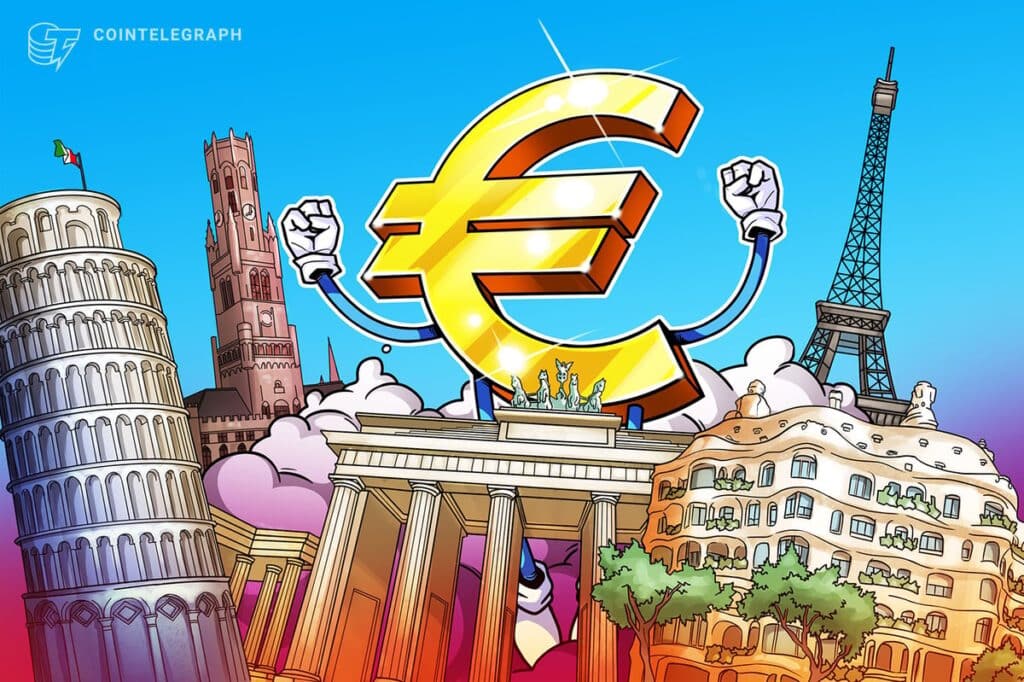Can the digital euro catch on in Europe?

The European Union launched the Euro currency in 1999 as part of its ambitious plan to create the European Union's Common Market.
Now, in the digital age, European institutions are considering creating a digital euro – part of what the European Central Bank (ECB) calls “the next step in the development of our currency”.
Digital Euro is working with the ECB to determine the design and technical aspects of the proposed Central Bank Digital Currency (CBDC). The multi-unit plan has recently completed the investigation phase.
The project has now moved into the preparation phase, with the ECB planning to complete it by October 2025.
While the digital euro is far from complete, it is causing discomfort for some EU citizens and politicians who see this change in common currency as a direct threat to their individual liberties.
In the year As reported by local media, some opponents are concerned about the privacy implications of the digital currency.
Despite the European Commission's claim that the new currency will have “the same level of privacy as cash”, there is a clear lack of trust among European citizens and politicians.
This thread shows what artificial intelligence is up to now. There I speak English, Portuguese, Spanish, French, Indonesian and Chinese in the Bundestag.
Wonderful. The more people hear that #CBDCs are dangerous, the better. https://t.co/jI0aeXtHwf
— Joana Cotar (@JoanaCotar) November 10, 2023
Although European authorities have released several communications about the nature of the digital euro, there is still much speculation about its eventual design.
Recent surveys show that citizens feel threatened by the potential surveillance powers governments can gain from the digital euro, while many others are not interested.

From the ECB Will one of the biggest projects threaten the fundamental freedoms of EU citizens? Or is this a miscommunication that can be corrected with proper debate and education?
Why does Europe need a digital euro?
The digital euro may be a buzzword, but it is simply a digitalized euro.
For the ECB President Christine Lagarde calls the digital euro “future-proof” the European currency.
The euro is key to our European unity. The digital euro with cash future-proofs our currency. It will be secure, easy to use and free of charge.
Although the decision to issue a digital euro will be taken later, we are now starting the preparation phase. pic.twitter.com/fs81p7otVW
— Christine Lagarde (@Lagarde) October 19, 2023
For others, it is something very profound that requires the full attention of a European citizen. In the year In a speech in December 2023, Fabio Panetta, governor of the Central Bank of Italy and member of the ECB's executive board, compared the digital euro to the financial revolution of Italy's first renaissance, which laid the foundation for the current banking system. . Panetta said the digital euro represents the next “tipping point in the evolution of money.”
These high-level declarations of support for the digital euro may be too abstract for the average citizen to understand, as more concrete arguments are needed to convince Europeans. European authorities must clearly answer why European citizens need the digital euro.
Not giving a clear case to the concerns of the digital euro before the project comes to fruition.
Latest: BTC Mining Centralization What Bitcoin Half Means
Stefan Berger, a German member of the European Parliament and member of the Christian Democratic Union of Germany, told Cointelegraph that Europe needs a digital euro to help other countries and regions of the world digitize their economies and experiment with digital currencies. .
“The popularity of crypto-assets has certainly led central banks to consider digital currencies to remain relevant in the growing digital financial landscape,” Berger said.
He believes that the digital euro must adapt as new technologies require new digital payment options. Berger emphasized how the Euro needed its digital version to survive.
“Without the digital euro, other digital central bank currencies and stablecoins could dominate the market.”
Maria Demertsis, a professor at the European University Institute and deputy director of the economic think tank Bruegel, said the ECB wants to create a digital euro to encourage financial inclusion in Europe and reduce the EU's dependence on external services. Providers, as well as those who have a digital equivalent of cash in the digital age.
Cash is still king in Europe.
European authorities' arguments for the digital euro as a reason for convenience and financial inclusion are complicated by the continent's vast payment system.
The Covid-19 pandemic may have caused digital payments across the continent, but cash is undoubtedly still the most popular payment option.
In the year By 2023, 59% of total payments are settled in cash. Although this overall percentage in the EU is trending downwards (as shown in the graph below), many of the 27 member states still prefer cash.

According to a study by technology consultants BearingPoint by the end of 2023, the use of cash is significantly higher in Austria (79%) and Germany (71%) than in other European countries. Switzerland (63%), Ireland (61%), the Netherlands (57%) and France (55%) show relatively high use of cash, but are behind Germany and Austria. Finland has the lowest cash usage frequency at 43 percent.
In addition to being a popular payment method, some see cash as a necessity, with some 30 million people, or 5% of Europeans, unbanked.
Indeed, European authorities have maintained the use of physical cash. On June 12, 2020, the Spanish government introduced a law allowing it to ban money. A day later, the ECB quickly stopped the initiative, stating that it is not allowed to remove cash in the European Union.
The threat of a cashless Europe has led ECB Lagarde to publicly say that the digital euro will “co-exist with physical money” and that there will be an “always-available” currency, the digital euro, with the aim of “leaving no one behind”.
This push for the coexistence of cash and digital money raises questions about the effectiveness of the digital euro.
“The lack of financial participation in Europe is not a big problem,” Markus Ferber, a member of the European People's Party group in the European Parliament, told Cointelegraph. “The digital euro can only be more inclusive if you completely remove the need for a bank account,” he believes.
However, Berger says, “Physical money is a freedom created. Even in the era of digitalization, it remains an integral part of society […] No matter how much digitization continues, money should never be at risk.
Another issue complicating Europe's digital and financial narrative is that cash is private, and people like privacy.
In the year In a 2022 ECB survey on consumer payment preferences, people using cash payments prefer the method as it allows them to maintain privacy. Berger explained how critical this point is to a successful digital euro.
“A CBDC that does not guarantee privacy and anonymity will never be accepted by citizens and is therefore meaningless.”
Joanna Kotar, an independent member of the German Bundestag, told Cointelegraph: “Privacy is essential for personal autonomy and financial freedom, protecting individuals from surveillance and censorship.”
The digital euro provides geopolitical strategic autonomy
Another goal of the Digital Euro is to provide an independent European payment infrastructure.
There are many payment services in Europe, but none of them work in the entire Eurozone. “There is no real pan-European digital payment system,” said Ulrike Bindseil, Executive Director of Market Infrastructure and Payments at the ECB. This situation forces users who want to pay digitally to rely only on private (mostly non-European) payment providers.
It highlights the “strategic autonomy” that the Digital Euro package can offer to reduce dependence on external payment service providers.
For Bindseil, EU citizens will benefit as the digital euro gives European merchants a “competitive opportunity to negotiate terms with private payment solution providers, reducing their own costs” and possibly lowering prices for EU buyers. . He added:
“A digital euro can be a catalyst for further innovation in the European payments sector.”
On the contrary, Ferber does not see a problem with the expansion of personal systems.
The European private sector pointed out how the participation of all European authorities in the European Payments Initiative could prepare a solution to the problem. “I don't want to see the digital euro overwhelm the existing systems,” he said.
Fear of the digital euro as a control mechanism
Ferber said that doubts about the digital euro are starting to appear in Europe, because “the proposed design features are very limited.” “It makes people start asking questions about added value,” he said.
For Berger, “It is critical that all open questions are answered with the participation of all groups.
Bindseil told Cointelegraph that the ECB welcomes “an ongoing democratic debate on the digital euro”.
Bindseil believes that “the Eurosystem has benefited greatly from feedback from European decision-makers, market participants and potential users”. “All European institutions must play their part to reach our common goal of making the Digital Euro a success,” he said.
Despite apparent transparency from politicians and institutions, many are still concerned about financial privacy. Since all payments are made on the digital infrastructure provided by the central bank, the ECB could hypothetically have access to every citizen's financial records.
“Some argue that the digital euro could be used as a centrally planned and managed Trojan horse for citizens' total political control,” Kotar said.
Others worry that the ECB could use this information in other ways, such as setting up the Chinese social credit system, which aims to monitor social behavior and measure the “loyalty” of Chinese citizens through measures such as paying bills. Timely, legal compliance and accurate reporting of financial information.
For Ferber, these concerns are unwarranted because “social outcomes are not the goal of this regulation, and no one intends to go down that path.” He added:
“Comparing the digital euro project to the CBCC, which is run by a dictatorial government, is not a fair comparison.”
But Kotar was not convinced. She told Cointelegraph, “Concerns about the misuse of the digital euro as a control tool are valid and should be taken seriously.
She cited the example of the truck driver demonstration in which the Canadian government froze the bank accounts of truckers who protested official COVID-19 safety measures.
Canada's federal court ultimately ruled that the use of the country's emergency laws to stop the flow of money and use of crypto to rival truckers was unreasonable and unconstitutional, but the incident showed how governments can influence the flow of money to political rivals.
Berger said, “The two issues [China and Canada] They have nothing to do with the ECB Digital Euro. We understand that criticism and concerns may arise as a result of the remaining open questions. However, the digital euro is a voluntary offer. Whether they choose to use it or not is a personal matter. But the European Parliament stands by the citizens.
The ECB's Bindsil said that “the Eurosystem has no interest in people's data or payment habits”, adding that financial regulators must ensure compliance to fight money laundering and money laundering, adding that “complete anonymity is at odds with other public policy objectives”. Terrorism.
The ECB can ensure the privacy of CBDC not by relying on promises from politicians, but by technology, such as launching the Digital Euro as an open source CBDC with no back doors.
Latest: Crypto Glass Ceiling: Barriers Remain for Women in Web3
While Ferber says he “doesn't believe it's necessary,” Kotar believes it's a positive way to ensure transparency and “reduce the risk of the house in the code.” :
“Open source CBCCs align with the principles of democratic governance and transparency, allowing citizens to hold regulators and central banks accountable for their design and implementation.”
Bindseil stressed that the digital euro “will not be a programmable currency”. He explained that there will be an option to automate payment options such as monthly rent, “but its use will never be limited to a predetermined purpose, like a voucher, with restrictions on where, when and with whom people can use it.” This aspect has already been seen in the legislative proposals of the European Commission.
Digital Euro has a number of pressing questions to address before its launch. Citizens and politicians need rational solutions supported by strong arguments, and the digital euro must demonstrate a guarantee of privacy, or it cannot win the trust of European citizens.













